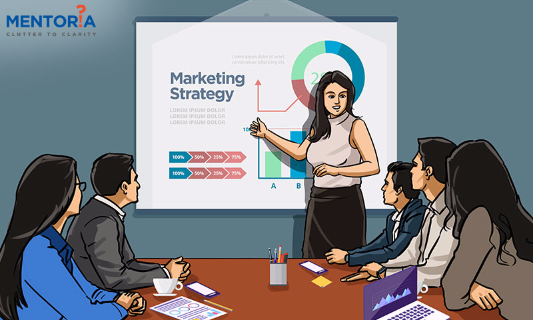Who is a Marketing Professional & What is a Marketer’s Role

“Marketing is no longer about the stuff you make but the stories you tell.”
– Seth Godin, Marketing Guru
Marketing is a part of our day-to-day life, sometimes very obviously and sometimes so subtly! Marketing makes you absolutely want those Levi’s you’ve been seeing everywhere. Just as marketing makes you desire the latest iPhone. Ideally, any pair of jeans or any other smartphone would do the job, but something makes us want one brand over another and that, my friends, is the power of marketing. It creates desire, builds loyalty, attaches ‘trustworthiness’ and appeals to the consumer in us. Simply put, marketing helps a brand sell to the right audience.
Given that we live in a consumer-centric world where a majority has a high purchasing power, marketing is a trending career field today. No matter what product or service you’re creating, you will need marketing to sell it. And with the digital evolution, a whole new segment of marketing has opened up online to complement traditional marketing.
Passionate about marketing? Take Mentoria’s holistic psychometric career assessment test to discover if marketing is the ideal career for you based on your unique interests, skills and personality!
But what does a Marketing Professional do?
Essentially, a marketing professional does everything from coming up with the coolest ways to promote a brand and its offerings, to actually handling the entire promotional plan. Here’s a list of some of the basic steps it involves:
1. Identify Your Target Group (TG)

As cliche as it may sound, you cannot sell a comb to a bald person. Step 1 is identifying who you’re selling the product to. Where do they live? What age group are you looking at? What are their interests and habits? Most marketers get these answers from a market survey. You can also use social media to observe your consumer’s behaviour – what are their other/connected interests, what devices do they use, which location is your biggest market, etc. This activity is called building a demographic, and it makes targeted marketing way more effective.
2. Build a Strategy

Once you have your target audience in place, it’s time to lay a strategy. Are you planning to woo your audience with one big advertising campaign across social media? Or are you planning multiple activities, each one customised to the portal you use? Are you also planning an event to grab your audience’s attention? Are you looking at a mix of print (newspaper ads, brochures, hoardings, etc.) and digital (Facebook ads, Instagram stories, YouTube ads, etc.)?
There are so many ways to approach a marketing strategy, but it all depends on the brand you’re promoting, the audience you’re reaching out to and the budget your client has set aside for promotions. Most marketers will think of simple ideas that can reach the audience through multiple channels (radio, TV, internet, print, etc).
3. Focus on Content

Promoting a brand is like making a movie. It’s going to need a great script, cool characters, catchy dialogues and should look gorgeous. No strategy is complete without a story and no story can be told without proper content. There are several content formats a marketing professional can play with – from simple banner ads that appear as you scroll on a website to detailed blog articles, infographics, videos and more.
4. Promote your content like nobody’s business

Once your “story” is ready, it is time to identify the channels that will help it reach your potential customers. Technology has now made it possible for you to not only identify where your TG lives but also which brand of phones they use and when they use it, which will help you customise your campaigns even better. However, this entirely depends on the brand’s budgets. If your brand has a high spending power, you’d be able to deliver different messages across different mediums. If not, you’ll have to figure out the best, most cost-effective way to achieve a similar impact through limited channels.
5. Track, Modify, Learn.

You’ve created a kickass campaign. You’ve promoted it on all the right channels. But has it worked as well as you planned? Did people actually visit your website or look up your brand after the campaign? There are several tools like Google Analytics and social media insights that will project these numbers for you. Track these numbers closely and modify your campaign based on what you see. Is a certain ad performing better over the others? Try to create more ads along similar lines. Make notes of what worked and what didn’t; it will help you with future campaigns.
Looking for guidance for your marketing career? Speak to Mentoria’s expert career counsellors for personalized step-by-step guidance at any point in your career journey.
Technology and Marketing

Technology is only getting easier by the day, not just for consumers but marketers too. Newer tech-related trends are emerging on a regular basis, and marketing agencies are quick to jump onto the next ‘trend’ wagon. Companies all around the world are adopting a ‘digital-first’ approach, which basically means that a campaign is first promoted online and then pushed to traditional channels like print and TV. If you love technology as much as you like sales and marketing, you’d do well in this field!
Bring Out Those Books!

If you’re serious about a career in marketing, you could opt for BMM (Bachelors of Mass Media) or BMS (Bachelors of Management Studies) after Class 12, and an MBA (Masters of Business Administration) in Marketing after you graduate. Take up as many internships as you can while you’re still studying; marketing is learnt best on the job. You could work with mainline or digital advertising agencies during your internships to learn the ropes, and apply to similar organisations or the marketing departments of larger corporates once you’re ready to work full-time. You also have the option to work on the creative side of marketing, where you write copies, design creatives or make ad films; or you could work on the business side, where you build strategies, make promotional plans and liaise with clients and vendors.
Marketing is a fun field with lots of opportunities and constantly emerging trends. If understanding audiences, influencing their minds and selling brands appeals to you, you’d be perfect for this line! Head to our website and get started on the assessment to figure out if this is the ideal career path for you.
Kick-start your career discovery journey with Mentoria & be sure to find the right career fit for you. Our 4-step career guidance solution, helps us find the right career fit for you from 3 streams, 850+ courses & 12,000+ careers.






